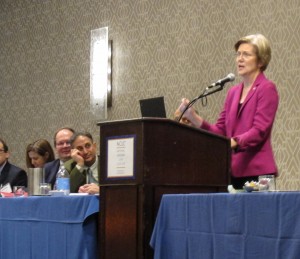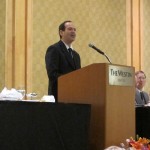Some Context for my Concern with Government Corruption
I realize that I probably look obsessed due to my many posts about government corruption. Perhaps that is because I saw it first-hand when I worked as an Assistant Attorney General for the State of Missouri. That was back in the late '80s, when William Webster served as Missouri Attorney General. My job required me to prosecute consumer fraud. That's not quite how it worked, however. If the target was a significant contributor, I would be given lots of excuses that good cases were "not good cases." I resisted for many months, documenting my cases as best I could and refusing to close good files--this behavior confused me at first, but then it became all too clear. Ultimately, several substantial cases against major contributors convinced Webster to transfer me out of of the Trade Offense Division. Because I refused his transfer, Webster fired me. Little did I know that my experiences would become a focus for the 1992 Missouri Governor's debate. The debate featured Mel Carnahan (the Democrat) versus William Webster (the Republican). Prior to this debate Webster had held a 20-point lead. The election occurred two weeks after this debate, and Webster conceded by 7:30 pm on election night. During the debate Carnahan blistered Webster with accusations much of the night. You'll get a flavor for this well-deserved barrage if you watch the first 5 minutes--I was discussed beginning at the 3-minute mark. One other Assistant Attorney General also took a bold stand. After it became clear to him that the office was corrupt, Tom Glassberg resigned, immediately driving to Jefferson City to file ethics charges against Webster. Tom wrote a letter defending my reputation and his letter was published by the Post-Dispatch. It was letter I will never forget. A few sentences were read at the Governor's Debate. Those were intense times for me, of course. You can't solve problems like this in a day. It requires immense patience and diplomacy, and bucking the system is risky. When you start resisting, you quickly see who has both a conscience and a backbone. When I see the constant stream of money for political favors stories, I'm disheartened but resolute. Corrupt money and power are formidable, but they can't prevail where good people organize. I'm sure that my time as an AAG was formative, and it continues to drive me forward. One last thought is a sad one for me, however. During the Webster scandal, the St. Louis Post Dispatch was an aggressive newspaper that did real investigative journalism thanks to excellent reporting by several reporters, including Terry Ganey. The Post-Dispatch no longer does significant investigative journalism, as is the case with most newspapers. Reporters across the country are being laid off by the hundreds, and this has led to a huge news vacuum. These days, we simply don't know what is going on in most corners of our government. Many stories don't see the light of day, and the mass media offer no local alternatives (local TV "news" tends to be a joke). Hence my non-stop interest in media reform through organization such as Free Press. Media Reform and Election Reform need to be fixed before we can meaningfully address any other issues. That has so sadly become apparent.



